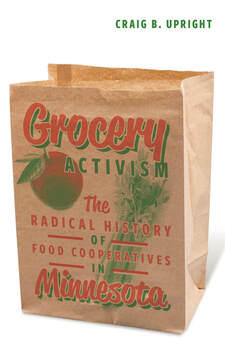About the Book
Grocery Activism: The Radical History of Food Cooperatives in Minnesota
by Craig Upright
University of Minnesota Press
Published Spring 2020
by Craig Upright
University of Minnesota Press
Published Spring 2020
|
Our notions of food co-ops generally don’t include images of baseball bat–wielding activists in the aisles. But in May 1975, this was the scene as a Marxist group known as the Co-op Organization took over the People’s Warehouse, a distribution center for more than a dozen small cooperative grocery stores in the Minneapolis area. The activist group’s goal: to curtail the sale of organic food. The People’s Warehouse quickly became one of the principal fronts in the political and social battle explored in Grocery Activism. The story of the fraught relationship of new-wave cooperative grocery stores to the organic food industry, this book is an instructive case study in the history of activists intervening in capitalist markets to promote social change. |
Focusing on Minnesota, a state with both a long history of cooperative enterprise and the largest number of surviving independent cooperative stores, Grocery Activism looks back to the 1970s, when the mission of these organizations shifted from political activism to the promotion of natural and organic foods. Why did two movements—promoting cooperative enterprise and sustainable agriculture—come together at this juncture? This book analyzes the nexus of social movements and economic sociology, examining how new-wave cooperatives have pursued social change by imbuing products they sell with social values.
Rather than trying to explain the success or failure of any individual cooperative, this book shows how members of this fraternity of organizations supported one another in their mutual quest to maintain fiscal solvency, promote better food-purchasing habits, support sustainable agricultural practices, and extol the virtues of cooperative organizing. A foundational chapter in the history of organic food, Grocery Activism clarifies the critical importance of this period in transforming the politics and economics of the grocery store in America.
“Grocery Activism fills a gaping hole in the literature on food activism, and it’s one that my students often ask about: the radical origins of food cooperatives. Readers shocked by Amazon’s purchase of Whole Foods may well feel nostalgic for the cramped spaces and dusty bins of the 1970s food cooperatives that are the focus of this book.”
— Julie Guthman, author of Agrarian Dreams: The Paradox of Organic Farming in California
“In the 1970s, the organic food movement needed to reach consumers, and food co-ops needed a reason to exist. Grasping the relationship between a social movement and an organizational form is not easy, but Grocery Activism achieves its aims in a clear, informative way. This book will interest anyone who wants to understand how local action can produce new and unexpected forms of market structure.”
— Kieran Healy, Duke University
Cover design by Brad Norr.
| grocery_activism_cover_-_large.jpg | |
| File Size: | 1002 kb |
| File Type: | jpg |
